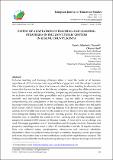| dc.contributor.author | Kundu Scholastic Namuki, Okutoyi Joel | |
| dc.date.accessioned | 2022-02-04T08:39:13Z | |
| dc.date.available | 2022-02-04T08:39:13Z | |
| dc.date.issued | 2020 | |
| dc.identifier.uri | https://repository.maseno.ac.ke/handle/123456789/4874 | |
| dc.description.abstract | Inclusive teaching and learning strategies strive to meet the needs of all learners,
regardless of difficult or need and support their engagement with the subject material.
One of the important principles of inclusive education is about teaching for diversity; this
means that the teacher has to be flexible and adaptive, recognize that different learners
have different ways and styles of learning, interpreting and understanding information.
An inclusive school must offer possibilities and opportunities for a range of working
methods and individual treatment to ensure that no child is excluded from
companionship and participation in the teaching and learning process otherwise their
learning would be jeopardized. A survey in Kisumu indicated that there were 662 public
ECD centers with 17 known to be having children with diverse needs in their regular
schools, however little was known on the extent to which these diverse individual needs
were being met during the teaching and learning process. The purpose of this study
therefore was to establish the extent to which teaching and learning strategies were
adapted in inclusive ECD centers in Kisumu County. A descriptive survey design was
used. The target population was 17 head teachers and 37 regular teachers. Saturated and
purposive samplings were used to select 15 head teachers and the 34 regular teachers.
Data was collected using questionnaires, observation and interview schedules.
Quantitative data was analyzed using descriptive statistics; frequency counts, percentage
and mean. Qualitative data was transcribed and analyzed through thematic analysis. The
findings revealed that the teaching-learning strategies were adapted to a large extent witha mean of M=4.44. The extent to which certain inclusive teaching and learning strategies
were used had a mean of 3.93 implying that the strategies used in these schools were
inclusive to large extent. This study implies that learners in inclusive schools were able
to participate effectively in the learning process as their needs were adequately met. The
study recommends that teachers embrace all-inclusive strategies in order to maintain
interactive sessions in classes. | en_US |
| dc.publisher | European Journal of Education Studies | en_US |
| dc.subject | inclusive education, teaching strategies, learners with special needs | en_US |
| dc.title | Extent of adaptation of teaching and learning strategies in inclusive public centers in Kisumu county,Kenya | en_US |
| dc.type | Article | en_US |

